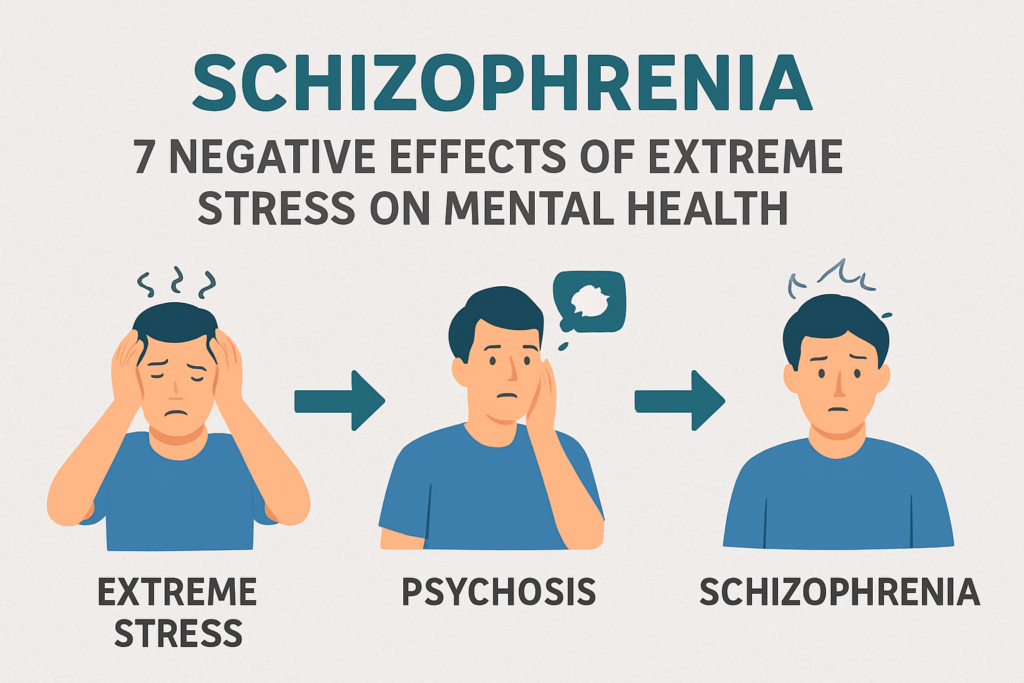
Schizophrenia: 11 Warning Signs That Stress May Be Turning Into a Disorder
How Extreme Stress Can Turn Into Schizophrenia: Understanding the Connection
Stress is a natural part of human life, but when it becomes overwhelming and prolonged, it can disrupt both mind and body. While everyday stress does not directly cause severe mental illnesses, research shows that extreme stress can act as a trigger for conditions like schizophrenia in people who are biologically or psychologically vulnerable.
This blog explores how ongoing stress affects the brain, the link between stress and schizophrenia, and what can be done to manage stress before it escalates into a severe mental health condition.
What is Schizophrenia?
Schizophrenia is a chronic mental health disorder that affects how a person thinks, feels, and behaves. People with this condition may struggle to distinguish between reality and imagination. Common symptoms include:
- Hallucinations (hearing or seeing things others do not)
- Delusions (false but strong beliefs)
- Disorganized thinking
- Social withdrawal
- Impaired daily functioning
While the exact cause of schizophrenia is not fully understood, it is known to be influenced by genetics, brain chemistry, and environmental stressors. Among these, extreme stress plays a crucial role in triggering or worsening symptoms.
How Extreme Stress Impacts the Brain
To understand the stress–schizophrenia link, it is essential to look at what happens inside the brain under chronic stress.
- Cortisol Overload – Prolonged stress floods the brain with cortisol, the stress hormone. High cortisol levels damage the hippocampus, which is responsible for memory and emotional regulation.
- Dopamine Dysregulation – Stress can disrupt dopamine, the neurotransmitter linked to motivation and reward. Schizophrenia is strongly associated with dopamine imbalances, which explains why stress worsens symptoms.
- Weakened Prefrontal Cortex – Stress reduces activity in the prefrontal cortex, the part of the brain responsible for rational thinking and decision-making. This makes it harder for individuals to cope with reality.
The Stress-Vulnerability Model of Schizophrenia
The stress-vulnerability model explains why not everyone under stress develops it. According to this model:
- Genetic vulnerability sets the foundation.
- Extreme stress acts as the environmental trigger.
- Poor coping skills and lack of social support increase risk.
For example, someone with a family history of schizophrenia may not show symptoms until they experience intense stress, such as trauma, job loss, or relationship breakdowns.
Early Warning Signs That Stress May Be Turning Into it
Recognizing early signs can prevent full-blown episodes. Some red flags include:
- Withdrawal from friends and family
- Strong paranoia or suspicion
- Intense anxiety that does not fade
- Difficulty concentrating on simple tasks
- Strange speech patterns
- Sleep disturbances
If these symptoms appear during periods of extreme stress, it is a signal that professional intervention is needed.
Case Example: How Stress Triggered
Consider the case of a 25-year-old student who excelled academically but faced continuous pressure from family and peers. Over time, stress escalated to insomnia, social withdrawal, and feelings of being followed. Eventually, he began experiencing hallucinations and delusions.
Doctors later diagnosed him with schizophrenia, triggered by prolonged stress combined with a genetic predisposition. This case illustrates how unchecked stress can evolve into a severe mental disorder.
Can Stress Alone Cause Schizophrenia?
The answer is no. However, in people who are already at risk due to genetic or biological factors, stress can:
- Trigger the first psychotic episode
- Worsen existing symptoms
- Increase chances of relapse
This means stress is not the root cause but a powerful accelerator of schizophrenia.
How to Manage Stress
Managing stress is one of the most important steps in preventing schizophrenia from being triggered. Practical strategies include:
- Therapy and Counseling – Cognitive Behavioral Therapy (CBT) helps in stress reduction and early symptom management.
- Mindfulness and Meditation – Regular mindfulness practices calm the nervous system and reduce cortisol levels.
- Healthy Lifestyle Choices – Adequate sleep, balanced nutrition, and exercise strengthen the brain against stress.
- Social Support – Having friends, family, or support groups can buffer the harmful effects of stress.
- Medication (when needed) – For individuals already at risk, doctors may prescribe preventive or stabilizing medication.
Schizophrenia and Stress: Breaking the Cycle
Once schizophrenia develops, stress often continues to worsen the symptoms, creating a vicious cycle. Stress increases psychotic episodes, and psychotic episodes create more stress. Breaking this cycle requires:
- Regular therapy sessions
- Strict medication adherence
- Building resilience through coping strategies
- Early intervention whenever stress increases
Final Thoughts: Stress and Schizophrenia
Extreme stress is not the sole cause of it, but it can act as a catalyst in vulnerable individuals. By understanding the warning signs, learning stress management techniques, and seeking professional help early, it is possible to prevent stress from spiraling into a severe mental illness.
Schizophrenia may be a lifelong condition, but with proper care and reduced stress levels, individuals can lead stable and meaningful lives.

